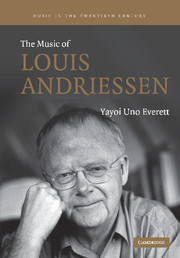Book contents
- Frontmatter
- Contents
- List of music examples and figures
- Acknowledgements
- List of abbreviations
- Introduction
- 1 Dutch music in the twentieth century
- 2 Formative years
- 3 Politics and “concept” works
- 4 Toward the metaphysical in art (1981–88)
- 5 Ramifications
- 6 Operatic collaboration with Peter Greenaway
- 7 Contemplative works
- 8 Epilogue
- Bibliography
- Index
5 - Ramifications
Published online by Cambridge University Press: 22 September 2009
- Frontmatter
- Contents
- List of music examples and figures
- Acknowledgements
- List of abbreviations
- Introduction
- 1 Dutch music in the twentieth century
- 2 Formative years
- 3 Politics and “concept” works
- 4 Toward the metaphysical in art (1981–88)
- 5 Ramifications
- 6 Operatic collaboration with Peter Greenaway
- 7 Contemplative works
- 8 Epilogue
- Bibliography
- Index
Summary
“Andriessen is a star in the USA,” reads the headline of a review in Het Parool regarding the performance of De Staat in 1986 by the New York Philharmonic Orchestra (Vogel 1986). Soon after De Staat won the Matthijs Vermeulen Prize and the UNESCO International Rostrum of Composers Prize in 1977, the piece received performances in Poland, Denmark, Russia, England, Canada, and the United States. In spite of its popularity, however, the reception of the politically-charged work abroad varied considerably from one locale to another. The British critics were rather cool; their reviews termed the music crude and exhausting, and questioned the relevance of the underlying populist stance (Adlington 2004a: 120–21). By contrast, American response was overwhelmingly positive. Following the US première at the California Institute for the Arts (Cal Arts) in 1983, De Staat was performed by the Los Angeles Symphony Orchestra and the San Francisco Symphony Orchestra (under John Adams) in the same year, at Tanglewood (under Gunther Schuller) in July 1984, and by the New York Philharmonic in May 1986. The exposure of American audiences to Andriessen's music led to a number of residencies in universities, beginning with Cal Arts (1983), Yale University (1986), the State University of New York at Buffalo (1990), and Duke University (1991). Andriessen quickly acquired status as an American “guru” to a host of young composers in pursuit of a new musical identity that could bridge the distance between modernist and popular musical culture.
- Type
- Chapter
- Information
- The Music of Louis Andriessen , pp. 144 - 169Publisher: Cambridge University PressPrint publication year: 2007

